新概念英语第二册Lesson 22 A glass envelope课件(共38张PPT)
文档属性
| 名称 | 新概念英语第二册Lesson 22 A glass envelope课件(共38张PPT) | 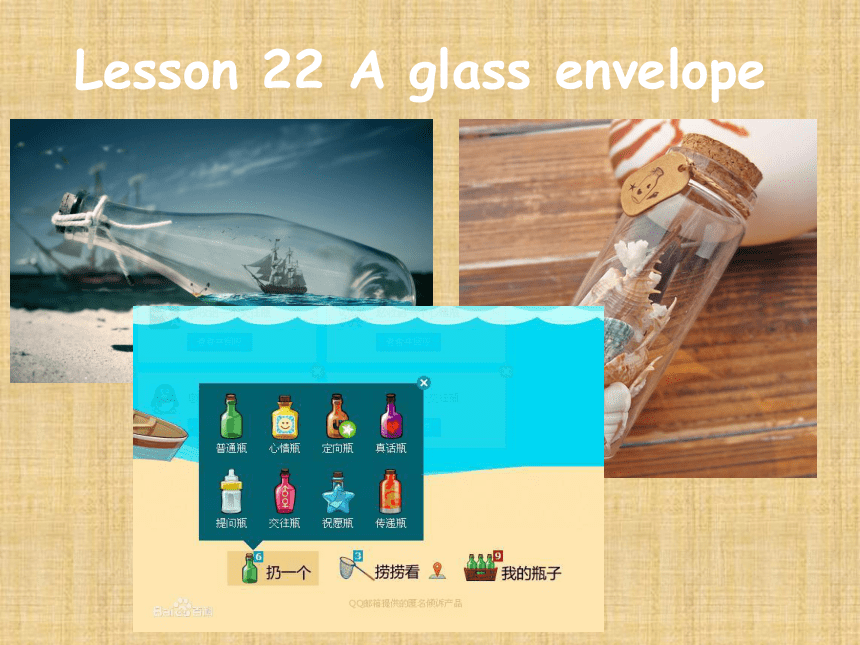 | |
| 格式 | ppt | ||
| 文件大小 | 1.5MB | ||
| 资源类型 | 教案 | ||
| 版本资源 | 新概念英语 | ||
| 科目 | 英语 | ||
| 更新时间 | 2023-12-23 20:39:47 | ||
图片预览

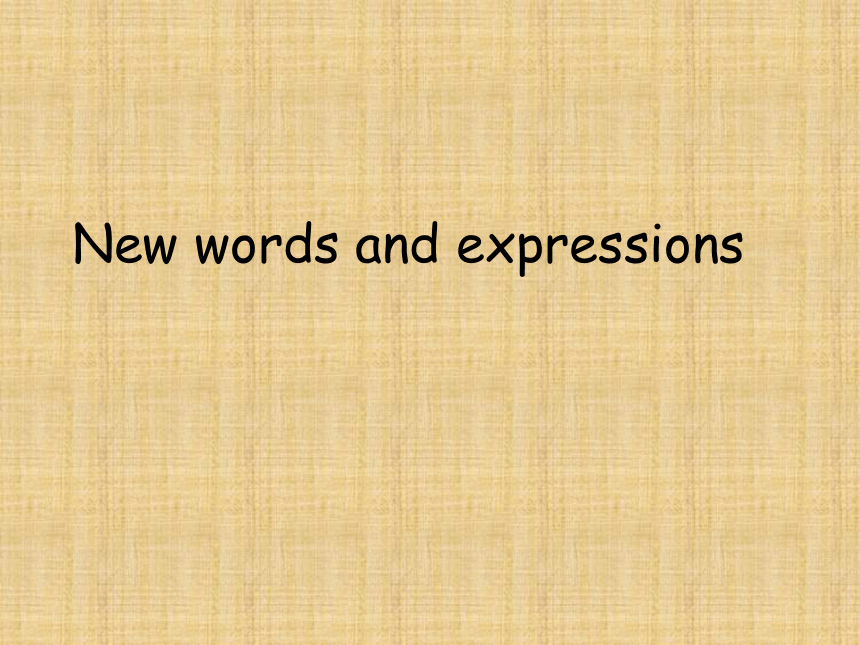
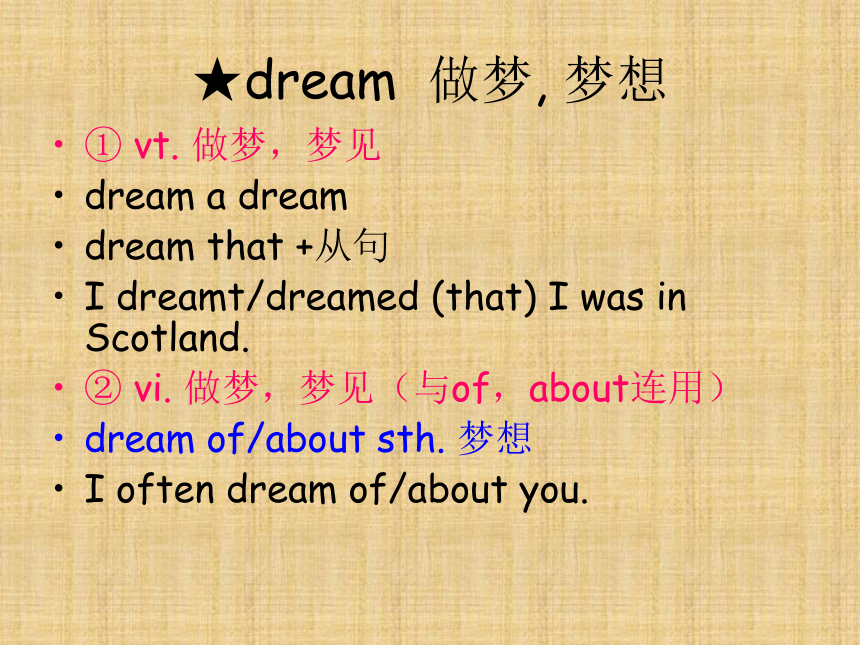
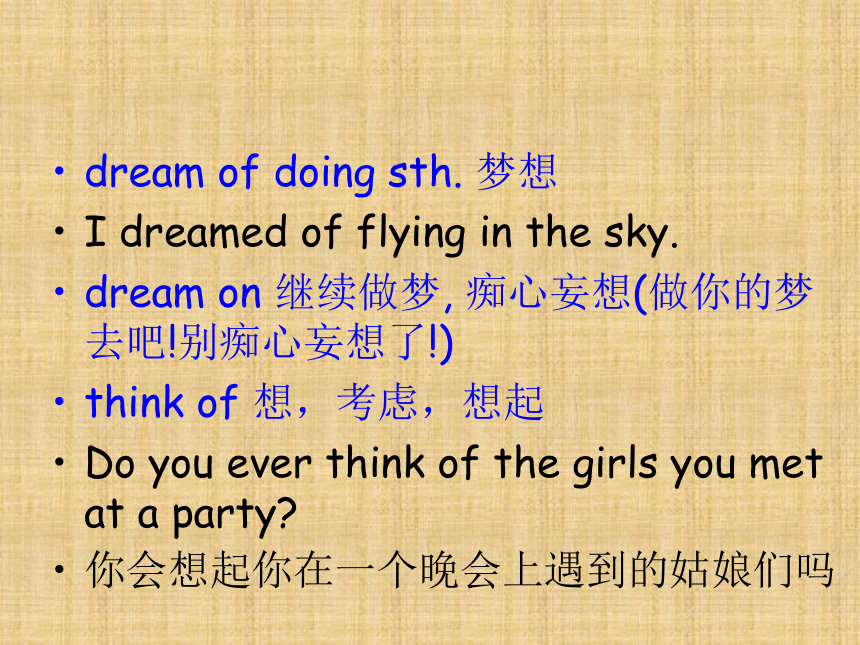

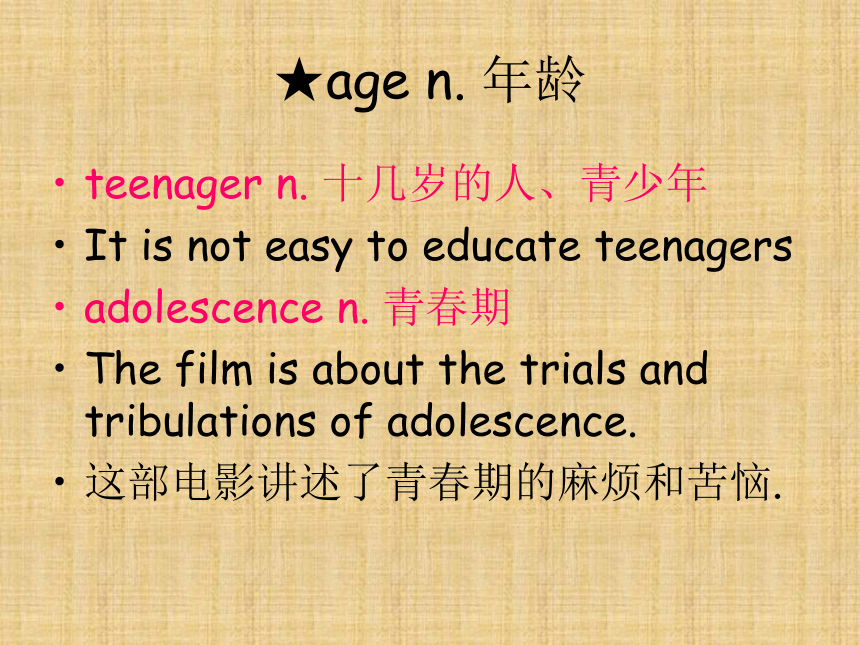
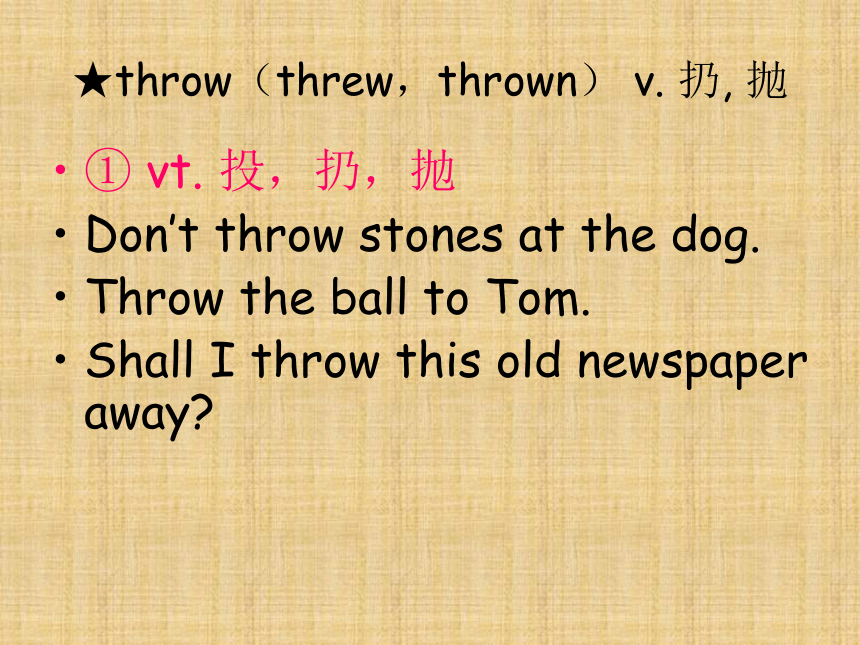
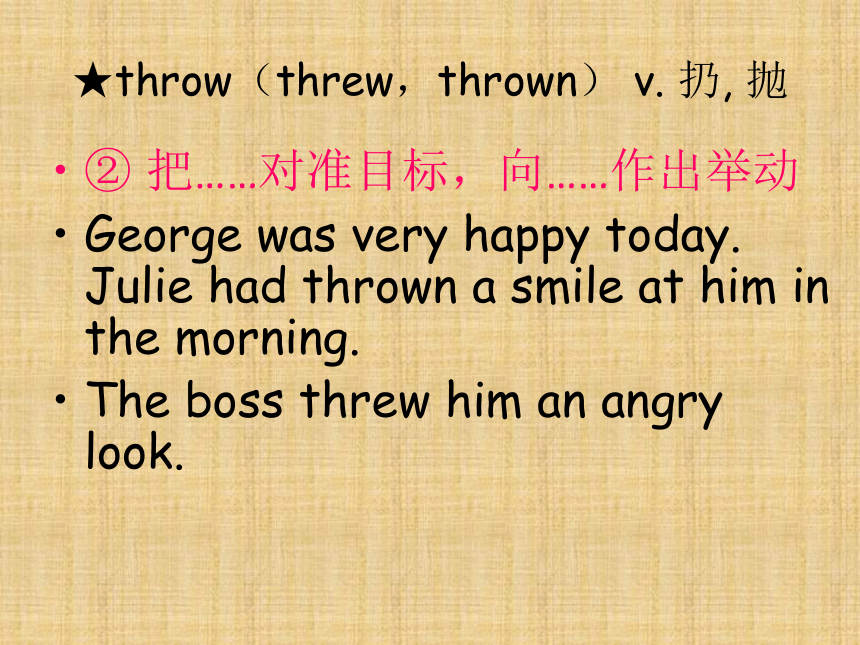
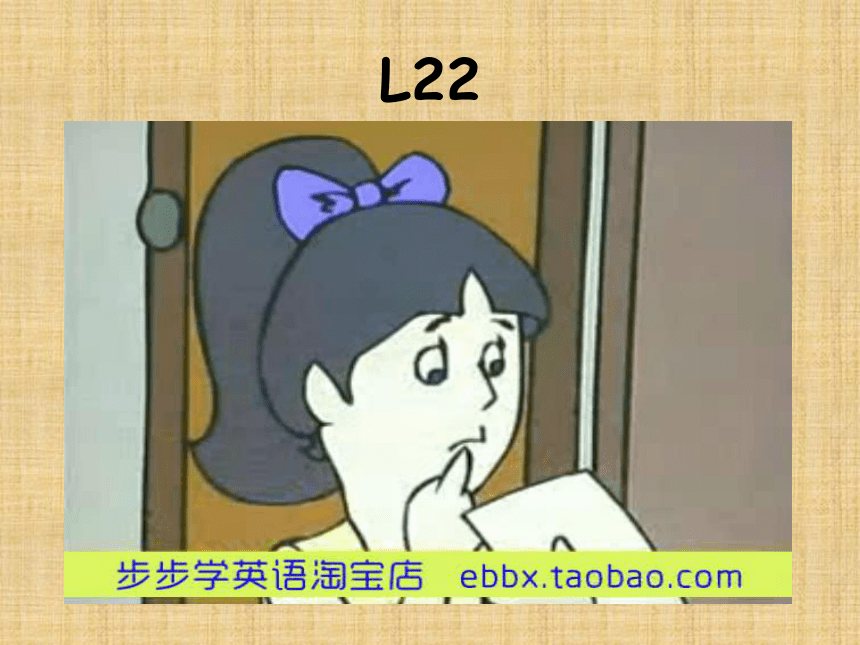
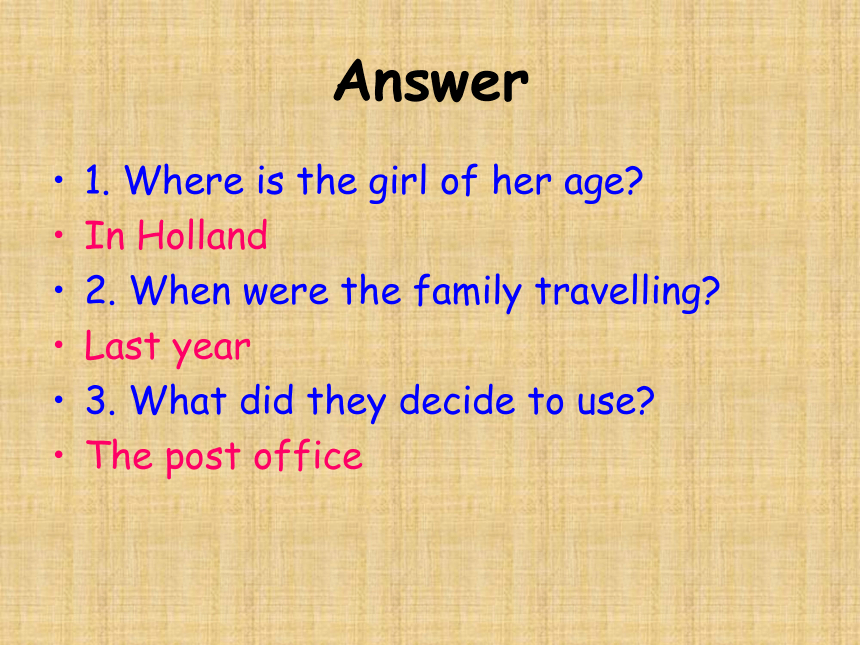

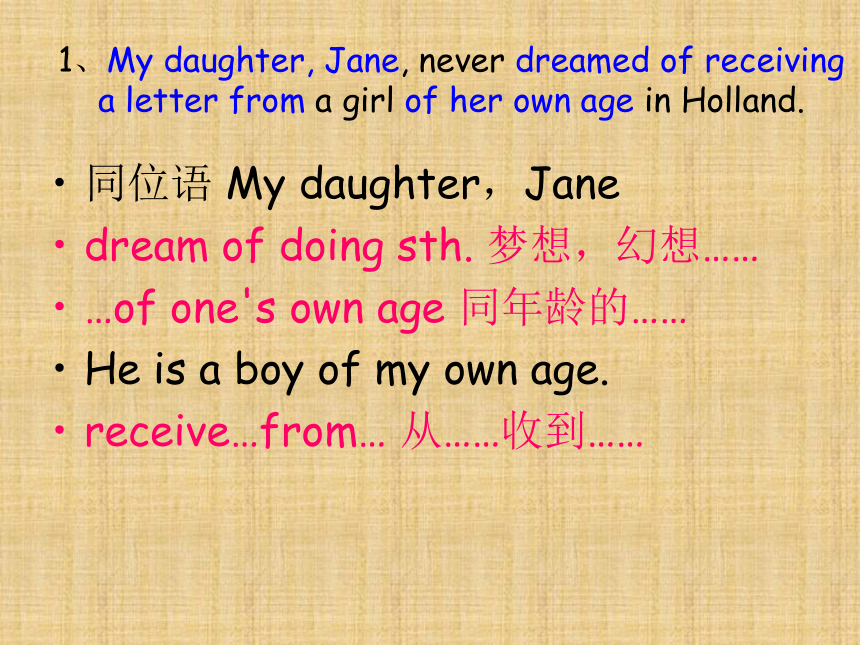
文档简介
(共38张PPT)
Lesson 22 A glass envelope
New words and expressions
★dream 做梦, 梦想
① vt. 做梦,梦见
dream a dream
dream that +从句
I dreamt/dreamed (that) I was in Scotland.
② vi. 做梦,梦见(与of,about连用)
dream of/about sth. 梦想
I often dream of/about you.
dream of doing sth. 梦想
I dreamed of flying in the sky.
dream on 继续做梦, 痴心妄想(做你的梦去吧!别痴心妄想了!)
think of 想,考虑,想起
Do you ever think of the girls you met at a party
你会想起你在一个晚会上遇到的姑娘们吗
③ n. 梦;梦想,幻想
have a dream = dream a dream 做了个梦
Have a good/sweat dream! 祝你做个好梦!
Have you heard of the American Dream
dreamboat 梦中情人, 梦寐以求的(物, 人)
Do you have dreamboat 你有梦中情人吗
daydream 思想开小差,做白日梦
She is daydreaming
★age n. 年龄
teenager n. 十几岁的人、青少年
It is not easy to educate teenagers
adolescence n. 青春期
The film is about the trials and tribulations of adolescence.
这部电影讲述了青春期的麻烦和苦恼.
★throw(threw,thrown) v. 扔, 抛
① vt. 投,扔,抛
Don’t throw stones at the dog.
Throw the ball to Tom.
Shall I throw this old newspaper away
★throw(threw,thrown) v. 扔, 抛
② 把……对准目标,向……作出举动
George was very happy today. Julie had thrown a smile at him in the morning.
The boss threw him an angry look.
L22
Answer
1. Where is the girl of her age
In Holland
2. When were the family travelling
Last year
3. What did they decide to use
The post office
Text
1、My daughter, Jane, never dreamed of receiving a letter from a girl of her own age in Holland.
同位语 My daughter,Jane
dream of doing sth. 梦想,幻想……
…of one's own age 同年龄的……
He is a boy of my own age.
receive…from… 从……收到……
2、Last year, we were travelling across the Channel and Jane put a piece of paper with her name and address on it into a bottle.
the Channel
= the English Channel 英吉利海峡
with 可放在句子后面做状语用,也可放在名词后面做定语。
这里的“with her name and address on it”用来修饰名词“a piece of paper”。
I have a bag with books in it. (“in it” 不能省略)
放在句子后面充当状语,在句中表状态或说明背景情况,常做伴随,方式,原因,条件等状语
She came into the room with her nose red.
She fell asleep with the light burning.
I won’t be able to go on holiday with my mother being ill.
3、Both girls write to each other regularly now.
write to sb. 给某人写信
write (a letter) to me
each other 相互,彼此,往往强调两者之间的相互 (注意连读)有时这个短语也可用来指许多人之间“互相”
We must all help each other.
one another 强调三或三者以上的相互,有时可替代each other
4、Letters will cost a little more, but they will certainly travel faster.
cost 意为“(使)花费,价钱为……”,其主语通常为某物或某件事情
It costs a lot to buy a house.
sth. cost (sb.) …花了某人…(钱)
The dress cost me twenty pounds.
4、Letters will cost a little more, but they will certainly travel faster.
more可做形容词, 又可做代词,文中的“more” 为代词= more money
give me more 再给我一点
a little 修饰比较级,译为“稍微”
much 修饰比较级,译为“多得多”
It's a little hotter.
It's much hotter.
That is more expensive. (贵一些)
That is a little more expensive. (稍微有点贵)
That is much more expensive. (贵得多)
but they will certainly travel faster.
——but they will certainly travel much faster. (快的多)
spend,take,cost,pay的区别
1.spend的主语必须是人,常用于以下结构:
spend time/money on sth. 在……上花费时间/金钱
I spent two hours on this maths problem.
spend time/money (in) doing sth. 花费时间(金钱)做某事
They spent two years (in) building this bridge.
spend money for sth. 花钱买……
He spent 2 yuan for these books.
2.cost的主语是物或某种活动,还可以表示"值"
sth. costs (sb) +金钱 某物花了(某人)多少钱
A new computer costs a lot of money.
(doing) sth. costs (sb)+时间 某物(做某事)花了(某人)多少时间
Remembering these new words cost him a lot of time.
take后面常跟双宾语,常见用法有以下几种:
It takes sb. +时间+to do sth.
做某事花了某人多少时间。
doing sth. takes sb. +时间
做某事花了某人多少时间
pay的基本用法是:
pay (sb) money for sth. 付钱(给某人)买……
pay for sth. 付……的钱
pay for sb. 替某人付钱。
pay sb. 付钱给某人。
许多动词后面加上介词后仍具有其通常意义,但它们与哪些介词连用却往往是固定的,如borrow from,believe in(相信,信仰),receive from等。还有些动词可与不同的介词连用,而动词的意义改变并不大,如dream of/about,help in/with,expect of/from等。在学习中,要牢记哪些介词与它们连用。如下动词和介词通常可以分开使用,可以有自己的宾语,并且大部分都可用于被动结构。
Grammar
后面可跟of/from/in/on的动词
1、后接of的动词:
accuse of(控告)He denied all accuse of him.
approve of(赞成)I quite approve of the idea
assure of(让…放心)He assured us of his ability to solve the problem.
beware of(谨防)Please beware of icy roads.
boast of/about(夸耀) He boasted of the new book he had just bought.
1、后接of的动词:
complain of/about(埋怨);
consist of(由……组成);
convince of/about(使信服);
cure of(治愈);
despair of(丧失……希望);
1、后接of的动词:
dream of/about(幻想);
expect of/from(期望);
hear of/from(听到……消息);
be/get rid of(摆脱);
1、后接of的动词:
smell of(闻到);
suspect of(对……猜疑);
think of/about(思考);
tired of(对……感到厌烦);
warn of/against(警告……有危险)
Someone must warm him of the difficulties. 必须有人提醒他有这些困难。
He has already been warned of them. 他已经被警告过了。
Don’t expect too much of your child.
He must have spoken of the matter to John.
I have never heard of the actress.
2、后接from的动词:
borrow from(从…借);
defend from/against (保护…使免于)
demand from/of(向…要求);
differ from(有别于);
dismiss from(解雇);
2、后接from的动词:
draw from(从…中得出);
emerge from(从…出现);
escape from(从…逃出);
excuse from/for(允许不…);
hinder from(阻止);
prevent from(妨碍);
2、后接from的动词:
prohibit from(不准许);
protect from/against(向……提抗议);
receive from(接到);
separate from(把……分开);
suffer from(受难)
He borrowed three books from Mary.
He always asked for help from parents.
3、后接in的动词:
believe in(信仰);
delight in(喜欢);
employ(ed) in (从事);
encourage in(鼓励);
engage(d) in(正做);
experience(d) in(在……有经验);
3、后接in的动词:
fail in(没有尽到);
help in/with(帮助);
include in(包括);
indulge in(沉醉);
instruct in(教导);
3、后接in的动词:
interest(ed) in(对……感兴趣);
invest in(投资);
involved in(卷入);
persist in(坚持);
share in(分享)
She delights in working hard. 她喜欢努力工作。
He failed in his French test. 他法语考试没有通过。
Jack helped me in driving the sheep home. 杰克帮我把羊赶回家。
Mrs. Turner is experienced in teaching. 特纳夫人很有教学经验。
4、后接on的动词:
act on(遵守);
based on(在…基础上);
call on(拜访);
comment on(评论);
concentrate on(集中于);
congratulate on(祝贺);
consult on/about(商量);
4、后接on的动词:
count on(依赖);
decide on(决定);
depend on(依靠);
economize on(节约);
embark on(从事);
experiment on(尝试);
insist on(坚持);
lean on/against(倚靠于…);
4、后接on的动词:
live on(靠…为生);
operate on(起作用);
perform on/in(扮演);
pride(oneself) on(为…感到自豪);
rely on(依靠);
vote on a motion/for someone(对…表决(投…的票));
write on/about(写…的事)
I think he wrote on the cost of living. 我想他写的是关于生活费用方面的。
He finally decided on going home. 他最后决定回家。
You can’t live on fruit only. 你不能只吃水果
Last Sunday, we called on Mr. Dupont.
上星期天,我们拜访了杜邦先生
Byebye
——Rachel
Lesson 22 A glass envelope
New words and expressions
★dream 做梦, 梦想
① vt. 做梦,梦见
dream a dream
dream that +从句
I dreamt/dreamed (that) I was in Scotland.
② vi. 做梦,梦见(与of,about连用)
dream of/about sth. 梦想
I often dream of/about you.
dream of doing sth. 梦想
I dreamed of flying in the sky.
dream on 继续做梦, 痴心妄想(做你的梦去吧!别痴心妄想了!)
think of 想,考虑,想起
Do you ever think of the girls you met at a party
你会想起你在一个晚会上遇到的姑娘们吗
③ n. 梦;梦想,幻想
have a dream = dream a dream 做了个梦
Have a good/sweat dream! 祝你做个好梦!
Have you heard of the American Dream
dreamboat 梦中情人, 梦寐以求的(物, 人)
Do you have dreamboat 你有梦中情人吗
daydream 思想开小差,做白日梦
She is daydreaming
★age n. 年龄
teenager n. 十几岁的人、青少年
It is not easy to educate teenagers
adolescence n. 青春期
The film is about the trials and tribulations of adolescence.
这部电影讲述了青春期的麻烦和苦恼.
★throw(threw,thrown) v. 扔, 抛
① vt. 投,扔,抛
Don’t throw stones at the dog.
Throw the ball to Tom.
Shall I throw this old newspaper away
★throw(threw,thrown) v. 扔, 抛
② 把……对准目标,向……作出举动
George was very happy today. Julie had thrown a smile at him in the morning.
The boss threw him an angry look.
L22
Answer
1. Where is the girl of her age
In Holland
2. When were the family travelling
Last year
3. What did they decide to use
The post office
Text
1、My daughter, Jane, never dreamed of receiving a letter from a girl of her own age in Holland.
同位语 My daughter,Jane
dream of doing sth. 梦想,幻想……
…of one's own age 同年龄的……
He is a boy of my own age.
receive…from… 从……收到……
2、Last year, we were travelling across the Channel and Jane put a piece of paper with her name and address on it into a bottle.
the Channel
= the English Channel 英吉利海峡
with 可放在句子后面做状语用,也可放在名词后面做定语。
这里的“with her name and address on it”用来修饰名词“a piece of paper”。
I have a bag with books in it. (“in it” 不能省略)
放在句子后面充当状语,在句中表状态或说明背景情况,常做伴随,方式,原因,条件等状语
She came into the room with her nose red.
She fell asleep with the light burning.
I won’t be able to go on holiday with my mother being ill.
3、Both girls write to each other regularly now.
write to sb. 给某人写信
write (a letter) to me
each other 相互,彼此,往往强调两者之间的相互 (注意连读)有时这个短语也可用来指许多人之间“互相”
We must all help each other.
one another 强调三或三者以上的相互,有时可替代each other
4、Letters will cost a little more, but they will certainly travel faster.
cost 意为“(使)花费,价钱为……”,其主语通常为某物或某件事情
It costs a lot to buy a house.
sth. cost (sb.) …花了某人…(钱)
The dress cost me twenty pounds.
4、Letters will cost a little more, but they will certainly travel faster.
more可做形容词, 又可做代词,文中的“more” 为代词= more money
give me more 再给我一点
a little 修饰比较级,译为“稍微”
much 修饰比较级,译为“多得多”
It's a little hotter.
It's much hotter.
That is more expensive. (贵一些)
That is a little more expensive. (稍微有点贵)
That is much more expensive. (贵得多)
but they will certainly travel faster.
——but they will certainly travel much faster. (快的多)
spend,take,cost,pay的区别
1.spend的主语必须是人,常用于以下结构:
spend time/money on sth. 在……上花费时间/金钱
I spent two hours on this maths problem.
spend time/money (in) doing sth. 花费时间(金钱)做某事
They spent two years (in) building this bridge.
spend money for sth. 花钱买……
He spent 2 yuan for these books.
2.cost的主语是物或某种活动,还可以表示"值"
sth. costs (sb) +金钱 某物花了(某人)多少钱
A new computer costs a lot of money.
(doing) sth. costs (sb)+时间 某物(做某事)花了(某人)多少时间
Remembering these new words cost him a lot of time.
take后面常跟双宾语,常见用法有以下几种:
It takes sb. +时间+to do sth.
做某事花了某人多少时间。
doing sth. takes sb. +时间
做某事花了某人多少时间
pay的基本用法是:
pay (sb) money for sth. 付钱(给某人)买……
pay for sth. 付……的钱
pay for sb. 替某人付钱。
pay sb. 付钱给某人。
许多动词后面加上介词后仍具有其通常意义,但它们与哪些介词连用却往往是固定的,如borrow from,believe in(相信,信仰),receive from等。还有些动词可与不同的介词连用,而动词的意义改变并不大,如dream of/about,help in/with,expect of/from等。在学习中,要牢记哪些介词与它们连用。如下动词和介词通常可以分开使用,可以有自己的宾语,并且大部分都可用于被动结构。
Grammar
后面可跟of/from/in/on的动词
1、后接of的动词:
accuse of(控告)He denied all accuse of him.
approve of(赞成)I quite approve of the idea
assure of(让…放心)He assured us of his ability to solve the problem.
beware of(谨防)Please beware of icy roads.
boast of/about(夸耀) He boasted of the new book he had just bought.
1、后接of的动词:
complain of/about(埋怨);
consist of(由……组成);
convince of/about(使信服);
cure of(治愈);
despair of(丧失……希望);
1、后接of的动词:
dream of/about(幻想);
expect of/from(期望);
hear of/from(听到……消息);
be/get rid of(摆脱);
1、后接of的动词:
smell of(闻到);
suspect of(对……猜疑);
think of/about(思考);
tired of(对……感到厌烦);
warn of/against(警告……有危险)
Someone must warm him of the difficulties. 必须有人提醒他有这些困难。
He has already been warned of them. 他已经被警告过了。
Don’t expect too much of your child.
He must have spoken of the matter to John.
I have never heard of the actress.
2、后接from的动词:
borrow from(从…借);
defend from/against (保护…使免于)
demand from/of(向…要求);
differ from(有别于);
dismiss from(解雇);
2、后接from的动词:
draw from(从…中得出);
emerge from(从…出现);
escape from(从…逃出);
excuse from/for(允许不…);
hinder from(阻止);
prevent from(妨碍);
2、后接from的动词:
prohibit from(不准许);
protect from/against(向……提抗议);
receive from(接到);
separate from(把……分开);
suffer from(受难)
He borrowed three books from Mary.
He always asked for help from parents.
3、后接in的动词:
believe in(信仰);
delight in(喜欢);
employ(ed) in (从事);
encourage in(鼓励);
engage(d) in(正做);
experience(d) in(在……有经验);
3、后接in的动词:
fail in(没有尽到);
help in/with(帮助);
include in(包括);
indulge in(沉醉);
instruct in(教导);
3、后接in的动词:
interest(ed) in(对……感兴趣);
invest in(投资);
involved in(卷入);
persist in(坚持);
share in(分享)
She delights in working hard. 她喜欢努力工作。
He failed in his French test. 他法语考试没有通过。
Jack helped me in driving the sheep home. 杰克帮我把羊赶回家。
Mrs. Turner is experienced in teaching. 特纳夫人很有教学经验。
4、后接on的动词:
act on(遵守);
based on(在…基础上);
call on(拜访);
comment on(评论);
concentrate on(集中于);
congratulate on(祝贺);
consult on/about(商量);
4、后接on的动词:
count on(依赖);
decide on(决定);
depend on(依靠);
economize on(节约);
embark on(从事);
experiment on(尝试);
insist on(坚持);
lean on/against(倚靠于…);
4、后接on的动词:
live on(靠…为生);
operate on(起作用);
perform on/in(扮演);
pride(oneself) on(为…感到自豪);
rely on(依靠);
vote on a motion/for someone(对…表决(投…的票));
write on/about(写…的事)
I think he wrote on the cost of living. 我想他写的是关于生活费用方面的。
He finally decided on going home. 他最后决定回家。
You can’t live on fruit only. 你不能只吃水果
Last Sunday, we called on Mr. Dupont.
上星期天,我们拜访了杜邦先生
Byebye
——Rachel
同课章节目录
